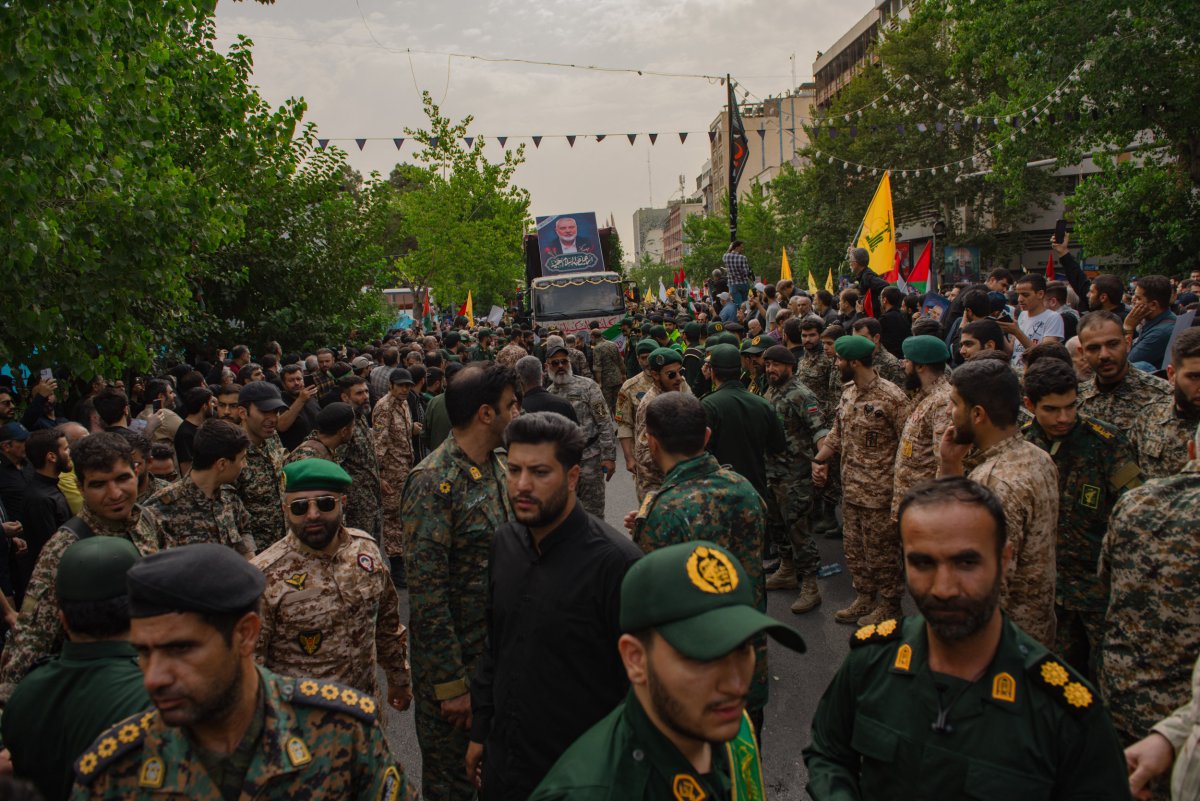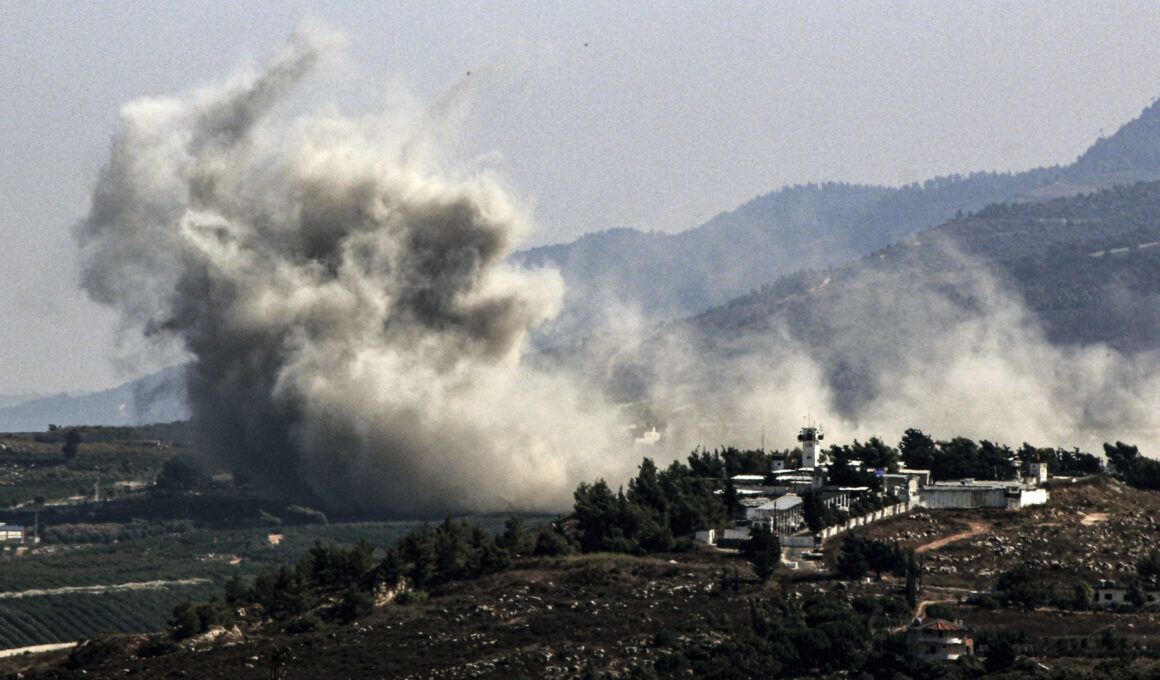An Israel Defense Forces (IDF) official shared with Newsweek insight into the nation’s calculus as Iran and its Lebanese ally Hezbollah promise to retaliate over the recent killings of senior officials amid the ongoing war in the Gaza Strip.
Israel is bracing for vengeance from Iran, Hezbollah and potentially other factions of the Axis of Resistance coalition in response to the back-to-back slayings last week of Hezbollah top military official Fouad Shukr in Beirut and Hamas Political Bureau chief Ismail Haniyeh in Tehran. The IDF has claimed the killing of Shukr, implicating him in a deadly rocket attack against a border town late last month, but has neither confirmed nor denied responsibility for killing Haniyeh.
Now, as the war in Gaza reached its 10th month in yet another moment of crisis for the Middle East, the IDF official told Newsweek that “we’re taking the words and the threats seriously, and we’re following it very seriously in terms of intelligence, alone and with our partners.”
“I think the Iranians will do their own calculation,” the IDF official said. “For sure, I can say that Hezbollah will react to the attack on Fouad Shukr. But we have shown what we do when you kill Israeli children, Israeli civilians.”
The Israeli military official then issued a direct warning to Hezbollah Secretary-General Hassan Nasrallah regarding the scope and scale of the anticipated attack.
“If Nasrallah will do something that will cause damage to civilians inside Israel, he’s taking the area to a wider escalation,” the IDF official said. “Our hope is not for a wider escalation, but we are in full readiness for that.”
Reached for comment, a spokesperson for Hezbollah referred Newsweek to the last two speeches delivered by Nasrallah, the latest of which saw the leader reaffirm that retaliation was forthcoming and could be coordinated alongside Iran and other Axis of Resistance factions, which include the Islamic Resistance in Iraq and Yemen’s Ansar Allah, also known as the Houthi movement.
“We can all respond at the same time,” Nasrallah said, “and it is possible that the interest of the Axis will emerge with us, that each one responds when he wants and in his own way with the goals and goals that it chooses, alone or within the framework of a comprehensive response by the entire Axis.”
He emphasized that “our response is certainly coming and will be strong, impactful and effective.”
Hezbollah has denied any role in the rocket attack last month that Israeli officials say killed 12 children and teenagers in the majority-Druze village of Majdal Shams in the Israel-occupied Golan Heights. Just as news broke of Shukr’s killing in the southern suburbs of Beirut, a Hezbollah spokesperson told Newsweek that the group would “certainly” respond to any attacks from Israel.
The IDF and Hezbollah have regularly exchanged cross-border attacks since the October 7 Hamas-led attack on Israel that sparked what has become the longest and deadliest war in Gaza.
Israeli officials estimate that around 1,200 people were killed in Hamas’ initial attack and that more than 320 IDF soldiers have been killed in the ensuing ground offensive. About 240 people were also taken hostage, around half of whom are believed to still be in the captivity of Hamas and allied Palestinian factions. The Palestinian Health Ministry based in Hamas-led Gaza has counted more than 39,600 people killed in the Palestinian territory since the war began.
Over the past 10 months, Israel has also struck 6,800 targets in Lebanon and killed more than 400 Hezbollah fighters, including at least two division commanders and the head of the Redwan special forces unit, as well as 100 Palestinian fighters in Lebanon, the IDF official told Newsweek.
Dozens more have been killed and tens of thousands displaced on both sides of the Israel-Lebanon border as a result of the intensifying clashes that have raised concerns over an even bigger war erupting.
Israeli officials have repeatedly said they were prepared to conduct an offensive into Lebanon if Hezbollah did not withdraw its units north of a buffer zone set by U.N. Security Council resolution 1701 following the last war fought in 2006. The IDF official emphasized that such an outcome must be achieved by diplomacy, currently spearheaded by U.S. envoy Amos Hochstein, or by other means.
“Either you choose the Hochstein negotiations for a new mechanism that will show Hezbollah is not next to the fence and we will understand, unlike 1701, how it will work, and if it won’t work like that, then we will need to do something else,” the IDF official said. “But we cannot live when we have Hezbollah next to the fence. We’re not the same country of the sixth of October.”

The deaths of Shukr and Haniyeh are not the first to put the region on edge over a looming response from Iran and its allies. In April, Iran conducted its first-ever direct missile and drone strike against Israel over a strike that killed senior Iranian military officials at an Iranian consular building in Syria.
Amid lingering protests over the killing of Shukr, Iranian threats of retaliation over Haniyeh’s killing have emanated over the past week from the highest levels of leadership in the Islamic Republic, including Supreme Leader Ali Khamenei and President Masoud Pezeshkian, whose swearing-in ceremony was attended by the Hamas chief just hours before his death.
Speaking at an emergency session of the Organization of Islamic Cooperation held in Saudi Arabia on Wednesday, Acting Iranian Foreign Minister Ali Bagheri Kani stated that, “in the absence of any appropriate action by the Security Council against the aggressions and violations of the Israeli regime, the Islamic Republic of Iran has no choice but to use its inherent right of legitimate defense against the aggressions of this regime.”
Newsweek has reached out to the Iranian Mission to the United Nations for comment.
Last month, in an exclusive interview with Newsweek prior to Haniyeh’s assassination but amid still-soaring regional tensions, Bagheri asserted that his nation “will make use of all our conventional capacities and potentials when it comes to facing and confronting the threats made by the Zionist regime.”
He referred to the April attack on Iran as “a very small-scale example of the potentials and capabilities of the Islamic Republic of Iran in order to stabilize deterrence and at the same time to create further stability.”
The IDF reported at the time the interception of the vast majority of more than 300 missile and drones launched from Iran. Israel received support from the U.S., France and the United Kingdom in defending against the attack, and Jordan, too, said it shot down projectiles over its airspace.
Responding to Newsweek‘s question during a press call on Wednesday, White House National Security Council Communications Adviser John Kirby said: “If Iran moves forward, as they have repeatedly said that they’re going to, we’re going to make sure we’re ready to defend Israel on our own interests.
“And we believe that the force posture adjustments ordered by the president and directed by the secretary of defense put us in a good position to do that.”
At the same, however, he said President Joe Biden‘s administration remained engaged in diplomatic efforts in a bid to avoid an Iranian attack.
“We’re involved in some pretty intense diplomacy here across the region, and it’s not just us. Many of our allies and partners are likewise involved,” Kirby said. “Let’s see where that takes us.”

While the Biden administration said it sought to avoid an escalation in the conflict that has consumed much of the Middle East, the U.S. has conducted military action against the Yemeni Ansar Allah and the Islamic Resistance in Iraq.
The latest U.S. strikes in Iraq roughly coincided with Haniyeh’s death, drawing new calls for the expulsion of U.S. forces from militias and condemnation from the Iraqi government. The strikes were followed Tuesday with an unclaimed rocket attack that injured five U.S. military personnel and two U.S. contractors at the Al-Asad Airbase in Iraq.
Just hours earlier, U.S. Central Command chief General Michael Kurilla arrived in Israel. The IDF official with whom Newsweek spoke hailed the visit as a sign of the continued partnership between the two allies and asserted that Israel’s offensive and defensive capabilities have been put on full display to foes.
“We have shown the other side what we can do with our superiority in a very accurate way,” the IDF official said. “I think the message was clear, and again, we are not looking for a wider escalation.
“We’re looking for Hamas to be dismantled, to be defeated. We’re looking to bring back home our hostages. We’re looking to get Hezbollah away from the fence so we can bring back our citizens safely. These are our goals, not a wider escalation, but at the same time, we need to protect ourselves.”






